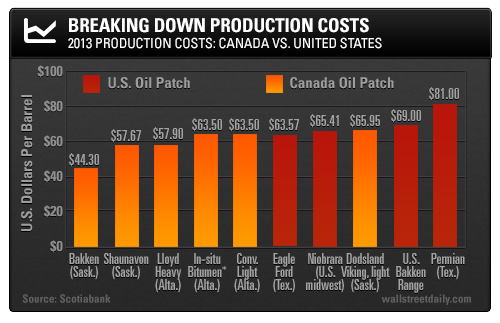Canadian oil sands operations are facing some significant hurdles right now.
Heck, even actor Leonardo DiCaprio is rallying against the industry for its impact on the environment.
He recently visited Alberta to learn “more about the Canadian tar sands [and] its impact on our climate.” He even nominated Canada’s Prime Minister (and tar sands proponent), Stephen Harper, for the ALS Ice Bucket Challenge.
Opposition to the industry has reached investors, as well. They’re beginning to shift their focus away from oil sands, as new sources of oil from U.S. shale plays have dominated the production scene.
Are Canadian oil sands really on the verge of obsolescence?
No offense to Leo, but the tar sands industry isn’t going anywhere. In fact, this corner of the market can still provide us with killer profit opportunities.
The Issues Plaguing Oil Sands Operations
Before we focus on the growth drivers in the oil sands industry, it’s important to realize what has investors skeptical about the industry’s future…
First of all, getting oil out of mud – which is what oil sands plays involve – is extremely expensive, takes a lot of resources, and is very time consuming.
The sands are also subject to a lot of scrutiny because harvesting oil from them requires three times more water for extraction and separation. Not to mention that it results in 20% more carbon dioxide emissions than typical oil production. This is because of the complex extraction process used to get the oil out of the sand.
On top of that, all that heavy oil coming from the Canadian oil sands must be shipped via pipelines to refineries – hundreds or even thousands of miles away. Competing sources of lighter and more easily refined oil from U.S. shale fields contend for space in the same pipelines. Plus, U.S. shale oil doesn’t have as far to go to be refined, and doesn’t have to cross international borders.
There’s no question that the industry faces several hurdles. Yet all of these issues are balanced by the economic incentive to produce.
Reviewing the Upside
The tar sands are estimated to contain more than 315 billion barrels of oil, more than any other known reserves in the world.
The Canadian oil sands supply over 40% of the oil produced by Canada. And the United States is a major buyer. We import more oil from Canada than any other county by far. Almost four times as much oil comes from Canada than from Mexico or Venezuela, and almost three times as much as what comes from Saudi Arabia.
Oil sands operations are improving, too…
Extraction technology is continuing to advance, which will make tar sands less dirty.
The oil extraction industry also contributes massively to the Canadian economy – especially in Alberta, where the majority of the tar sands are located.
The single biggest reason oil sands extraction will survive and thrive is one that actually surprises most investors.
You see, despite the fact that oil sands operations are complex and resource intensive, production actually costs less than most shale plays.
Oil from the tar sands is produced for between $60 and $65 per barrel at the source. With oil prices hovering around $95, that’s a lot of margin and a lot of built-in resilience.
Bakken oil, on the other hand, costs in excess of $69 per barrel to produce, and Permian costs even more.
As the chart below indicates, the existing tar sands oil projects fall into the middle or lower end of the scale when it comes to production costs.

To top it off, the weakness in the Canadian dollar makes oil sands even more attractive, as the oil produced is sold on the market in U.S. dollars.
Bottom line: The oil sands are still producing profitably, and will probably continue to do so, even in the face of new shale oil discoveries.
Sure, shale oil producers will keep dominating mainstream headlines as the amount of oil they produce continues to increase. But from a profitability standpoint, companies like Suncor (NYSE:SU) – the big tar sands player – will continue to generate bigger profits. Maybe that’s why shares of Suncor are trading closer to their 52-week highs despite the pullback in the price of oil.
Don’t follow the hype. Keep investing in oil sands until this party is officially over.
And “the chase” continues...
BY Karim Rahemtulla
